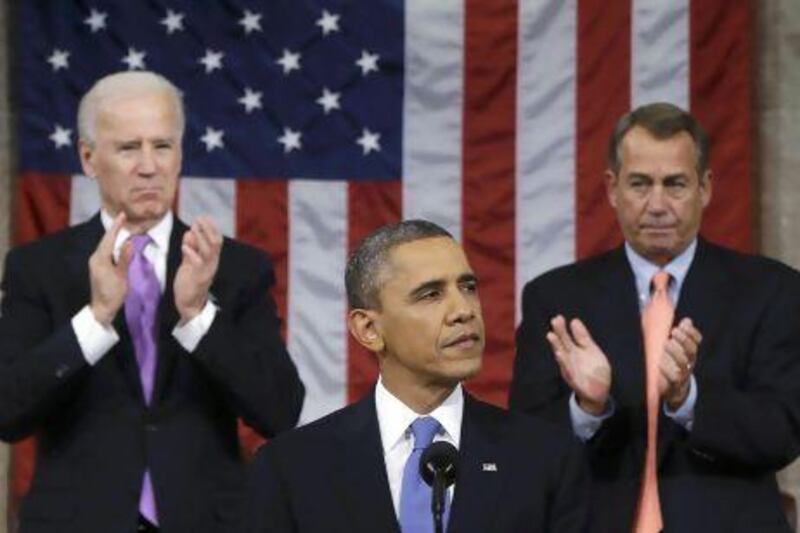NEW YORK //In a major address to the US Congress, Barack Obama briefly touched on his vision for a scaled-back US role in the Middle East during his second term but fell short of delivering an underlying strategy that many of his critics have called for.
The US president declared the era of US war and occupation was drawing to an accelerated close with his announcement that 34,000 of the 66,000 remaining US troops in Afghanistan would leave within the year, forcing Afghans to take the lead in combat operations.
"This spring, our forces will move into a support role, while Afghan security forces take the lead ... by the end of next year, our war in Afghanistan will be over," he said, as both Democratic and Republican legislators stood to applaud. It was the only bipartisan ovation he received during Tuesday's state of the union address.
It was the first time that the US administration has detailed the rate of troop reductions leading up to the 2014 withdrawal deadline.
But Mr Obama did not give any details about the number of troops that will carry out the post-2014 missions of training Afghan forces and conducting counter-terrorism operations against the Taliban and the remnants of Al Qaeda.
"It doesn't matter because the view from the ground in Afghanistan and the region is that if the insurgency wasn't defeated by 150,000 troops, then how is it going to be taken care of by 15,000 or 5,000?" said Moeed Yusuf, a South Asia expert at the Washington-based US Institute of Peace.
The only way that the Afghan national security forces will be able to maintain stability is if a political settlement involving the Taliban seems achievable, Mr Yusuf said. While the goal of extricating the US from wars that his administration inherited may be on the horizon, Mr Obama described the redefined fight against terrorism: open-ended operations across the globe against groups that "pose the gravest threat to Americans".
"To meet this threat, we don't need to send tens of thousands of our sons and daughters abroad, or occupy other nations," he said. "Instead, we will need to help countries like Yemen, Libya, and Somalia provide for their own security, and help allies who take the fight to terrorists, as we have in Mali."
Mr Obama also addressed the increasing controversy his administration is facing over the covert targeted killings carried out by drones - mostly in countries such as Pakistan and Yemen - which have increased during his presidency.
With Congress demanding more transparency of the secret programme and civil liberties groups claiming that the assassinations are a violation of American and international law, Mr Obama said that the "range of capabilities" - he did not actually name the drones - are legal and that there is sufficient oversight.
"I recognise that in our democracy, no one should just take my word that we're doing things the right way," he said, adding that he would work to ensure that the measures are legal and more transparent.
Critics, seeking direction on Mr Obama's Middle East plan, contend that the administration's lack of a coherent strategy for the Arab Spring uprisings has confused potential and longtime allies in the region. Syria has been used as an example: Mr Obama initially said the regime of Bashar Al Assad must go, but then pushed for a diplomatic solution while refusing crucial military support for the Syrian rebels as the war ground to a stalemate. He also refused to arm or train select rebel groups even as his security advisors urged him to do so, recent reports showed.
In Tuesday's speech, he would only say: "We will keep the pressure on a Syrian regime that has murdered its own people, and support opposition leaders that respect the rights of every Syrian."
He gave slightly more detail regarding his hands-off engagement with post-Arab Spring countries, saying, "The process will be messy, and we cannot presume to dictate the course of change ... but we can - and will - insist on respect for the fundamental rights of all people."
There was almost no mention in the speech of the issue of Israeli-Palestinian peace efforts, although there have been recent signs that the administration may again try to tackle the conflict. Mr Obama is planning a trip to Israel and the West Bank next month and, last Friday, he issued a public memorandum urging Congress to lift holds on nearly US$500 million (Dh1.8 billon) in aid for the Palestinian Authority.
But experts still do not expect the efforts to lead to a breakthrough, after his first term failure to extract compromises from the government of Israeli prime minister Benyamin Netanyahu.
"A weak government made up of a strange combination of political parties, like Netanyahu's, usually does not take a tough position on anything," said Marina Ottaway, a senior scholar at the Woodrow Wilson Center think tank in Washington
twitter: For breaking news from the Gulf, the Middle East and around the globe follow The National World. Follow us






